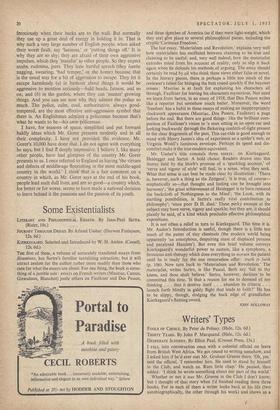Some Existentialists
THE first of these, a volume of accurately translated essays from Situations, has Sartre's familiar tantalising attraction; but it will attract zealots for the author rather .more readily than those who care for what the essays are about. For one thing, the book is some- thing of a jumble sale : essays on French writers (Mauriac, Camus, Giraudoux, Blanchot) jostle others on Faulkner and Dos Passos, and three sptches of America (as if they were light-weight, which they are) give place to several philosophical pieces, including the cryptic 'Cartesian Freedom.
The last essay, 'Materialism and Revolution,' explains very well how materialism has oscillated between claiming to be true and claiming to be useful; and, very well indeed, how the materialist extrudes mind from his account of reality, only to slip it back again when he defends his methods of arguing. The essay should certainly be read by all who think these views either false or novel. In the literary pieces, there is perhaps a little too much of the reviewer's talent for bringing the butt round quickly if the bayonet misses : Mauriac is at fault for explaining his characters all through, Faulkner for leaving his characters mysterious. Nor need we learn from Sartre, in an essay of 1938, that Dos Passos writes like a reporter but somehow much better. Moreover, the word `freedom' has a habit in these essays of making an inappropriately clockwork appearance (Mauriac, Dos Passos, Faulkner) a page before the end. But there are good things : like the brilliant com- parison of Faulkner's vision to 'a man sitting in an open car and looking backwards' through the flickering confetti-of-light present to the clear fragments of the past. This car-ride is good enough to stand with Henry James's idea of experience as a spider's web, or Virginia Woblf's luminous envelope. Perhaps its speed and dis- comfort make it the true modern equivalent.
Mr. Ussher's title conceals three essays : on Kierkegaard, Heidegger and Sartre. A bold choice. Readers drawn into this thorny field by the blurb's promise of a 'sparkling account,' of `verve and vigour of style' will find, in a sense, what they seek. What that sense is can best be made clear by illustration : 'There is, however, such a thing as the Zeitgeist'; 'it is true, of course— emphatically so—that thought and feeling can be brought into harmony'; 'the great achievement of Heidegger is to have restored the backcloth of Nothingness to the Mind'; 'the Look, with its startling possibilities, is Sartre's really vital contribution the philosophy'; 'since poor D. H. died.' These perky swoops at the subject may have verve, vigour and sparkle; but they are, it should plainly be said, of a kind which precludes effective philosophical expositions.
It is not often a relief to turn to Kierkegaard. This time it is. Mr. Auden's Introduction is useful, though there is little too much of the patter of, tiny chestnuts (the modern world being apparently 'an amorphous, despairing mass of displaced persons and paralysed Hamlets'). But even this brief volume conveys Kierkegaard's wonderful power to sustain, like a symphony, a ferocious anti-therapy which does everything to worsen the patient until he is ready for the one remorseless offer : truth is faith (p. 106). Now turn back to 'Materialism and Revolution.' The materialist, writes Sartre, is like Pascal. Both say 'fall to thy knees, and thou shalt believe.' Sartre, however, declines f to be committed this time. 'Is that a reason for me to demand of my thinking . . . that it destroy itself . . . abandon its criteria . . launch forth blindly in giddy flight that leads to faith?' He hai to be slippy, though, dodging the back edge of grandfather Kierkegaard's flaming sword.
JOHN HOLLOWAY














































 Previous page
Previous page